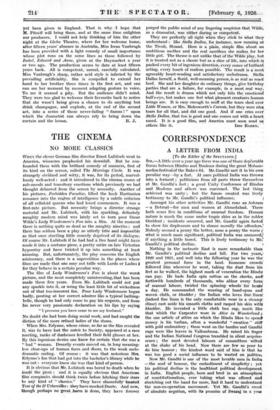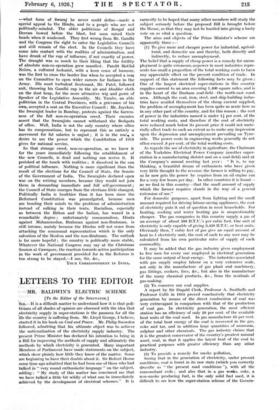CORRESPONDENCE
A LETTER FROM INDIA
[To the Editor of the SPEcrATon.]
Stit,—A little over a year ago there was one of those deplorable fracas between Hindus and MOslerns during the great Moham; medan festival Of the Bakr-i-Id. Mr. Gandhi met it in his own peculiar way-=by a fast. At once political India was thrown into a ferment ; ' politicians from 'all parts threw themselves at Mr. Gandhi's feet ; a great Unity Conference of Hindus and Moslems and others was convened. The last thing achieved was unity ; but the furore created was lively testimony to Mr. Gandhi's political influence:' Amongst his other activities Mr. Gandhi runs an Ashram
a Retreatfor men and women at Ahmedabad. There both sexes live in conditions of unusual freedom. Human' nature is much the same under tropic skies as in the colder; Occident ; incidents occurred, and Mr. Gandhi again fasted' to show his' displeasure and to shame morally the offenders.{ Nobody seemed a penny the better, none a penny the work ;.1 what is much more significant, political India was unmoved; if anything a little bored. This is lively testimony to Mr: Gandhi's political decline.
Nothing in the meteoric East is more remarkable than Mr. Gandhi's political- decline and fall. For two years,' 1920 'and'1921, and well into the following year he was the greatest personal force in the land: Immense crOwds followed him wherever he went, taking the dust from his feet as he walked, the highest mark of veneration the Hindu can pay. He bade India spin cotton on the charka, and! forthwith hundreds of thousands, who abhor every form! of manual labour, twirled- the spinning. Wheels = for hours a day. He commanded the wearing of hand-spun and woven cloth, or khaddar ; the Indian who loves firidilineni (indeed fine linen is the only comfortable wear in a steamy: clime) cast aside his smooth cloths and rasped his skin witlg khaddar. He invented a little cloth box cap; much like that which the Carpenter wore in Alice in Wonderland the one article of attire on which the Hindu likes to-spendi money is his turban, often a wonderful " creation " stiff With gold embroidery ; these went on the bonfire and Gandhi caps were like leaves in Vallombrosa. He raised his finger and the Indian National Congress trembled in silent acquies- cence ; the most devoted labours of committees ' wilted at the shake of his head. Now there are few so poor to dO hini honour ; the kindest Word said of hini is that he was too good a social influence to be wasted on Politics.
Now Mr.. Gandhi is one of the most lovable men in India —the soul of honour, the eMbodiment of simplicity ; yet hii political decline is the healthiest' political developinent.. in India. English' people, born and bred 'in an atmosphere Of constitutionalism, ever 'taking what was offered and stretching Out the hand for more, find it hard to Understand the non-co-operation movement. Yet Mr. Gandhi's creed of absolute negation, with its promise of Swaraj in a yea' —What form of Swaraj he never could define—made a special appeal to the Hindu, and to a people who are not politically-minded. The older politicians of Bengal and Deccan .. bowed before the blast, but soon raised their heads when it weakened. They first wrung from Mr. Gandhi and the Congress the right to enter the Legislative Councils and still remain of the elect. In the Councils they have_ come into contact with the realities of administration, and have drunk of the cup of influence, if not exactly of power: The draught was so much to their liking that the futility of absolute non-co-operation grew manifest. Pandit Motilal Nehru, a cultured hedonist, with a keen sense of humour, was the first to cross the border line when he accepted a seat on the Committee to open wider careers for Indians in the Army. His most turbulent lieutenant, Mr. Patel, followed suit, throwing his Gandhi cap in the air and khaddar cloth on the dust heap, for the more attractive wig. and gown of Speaker of the Legislative Aisembly. Mr. Tambe, an able politician in the Central Provinces, with ,a grievance of his own, accepted a seat on the Exectitive Council ; Mr. Jayekar, the Swarajist leader in Bombay, protests against the barren- ness of the full non-co-operation creed. Their enemies assert that the Swarajists cannot withstand the fleshpots of office. Well, India is not the only country where office has its compensations, but to represent this as entirely a movement for fat salaries is unjust ; it is in the mai.* a desire to use the power which the Constitution of 1i119 gives for national service.
So that strange creed, non-co-operation, as we knew it.- for the years immediately following the establishment of the new Councils, is dead and nothing can revive it. It perished at the touch with realities ; it dissolved in the sun of political influence. Nothing is more significant than the result of the elections for the Council of State, the Senate of the Government of India, The Swarajists declared open war on the retiring members, because they would not join them in demanding immediate and full self-government ; the Council of State emerges from the elections little changed. Politically India is healthier than it has been since the Reformed Constitution was promulgated, because men are bending their minds to the problems of administration instead of sulki g in their tents. Racialism, especially as between the Briton and the Indian, has waned in a remarkable degree ; unfortunately communalism, Hindu against Mohammedan, Brahman against non-Brahman, is still intense, mainly because the Hindus will not cease from attacking the communal representation which is the only salvation of the Moslem and the non-Brahman. The outlook is far more hopeful ; the country is politically, more stable. Whatever the National Congress may say at the Christmas Session at Cawnpore, the reaction towards active participation in the .work of government provided for in the Reforms is too strong to be stayed.—I am, Sir, &c.,
YOUR CORRESPONDENT IN INDIA.



























































 Previous page
Previous page